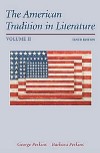SONG OF MYSELF, 6
A child said What is the grass? fetching it to me with
full hands;
How could I answer the child? I do not know what it is
any more than he.
I guess it must be the flag of my disposition, out of
hopeful green stuff woven.
Or I guess it is the handkerchief of the Lord,
A scented gift and remembrancer designedly dropped,
Bearing the owner's name someway in the corners, that
we may see and remark, and say Whose?
Or I guess the grass is itself a child, the produced babe
of the vegetation.(1)
Or I guess it is a uniform hieroglyphic,
And it means, Sprouting alike in broad zones and narrow
zones,
Growing among black folks as among white,
Kanuck, Tuckahoe, Congressman, Cuff, I give them the
same, I receive them the same.(2)
And now it seems to me the beautiful uncut hair of graves.
Tenderly will I use you curling grass,
It may be you transpire from the breasts of young men,
It may be if I had known them I would have loved them,
It may be you are from old people, or from offspring taken
soon out of their mothers' laps,
And here you are the mothers' laps.
This grass is very dark to be from the white heads of old
mothers.
Darker than the colorless beards of old men.
Dark to come from under the faint red roofs of mouths.
O I perceive after all so many uttering tongues,
And I perceive they do not come from the roofs of mouths
for nothing.(3)
I wish I could translate the hints about the dead young men
and women,
And the hints about old men and mothers, and the offspring
taken soon out of their laps.
What do you think has become of the young and old men?
And what do you think has become of the women and children?
They are alive and well somewhere,
The smallest sprout shows there is really no death,
And if ever there was it led forward life, and does not wait
at the end to arrest it.
And ceased the moment life appeared.
All goes onward and outward, nothing collapses.
And to die is different from what anyone supposed, and
luckier.(4)
—1855
Questions for Writing and DiscussionWhat kind of answers are these to the "child's" question? (Would they be likely to satisfy a child?) What kinds of possibilities of "reading" or "interpreting" the grass are offered? What does this answer imply? If you had to put it into a category, what would it be? What of this answer? What does he mean when he says "I perceive they do not come from the roofs of mouths for nothing"? Does this represent a shift in tone from the preceding? What is it, then, to die? Why is it "luckier" than anyone supposed?
Connect the readings: Compare the kind of theology expressed here with that expressed in, for example, Hopkins's "Pied Beauty." Are there similarities in the "proofs" the poets offer for their views?
WHEN I HEARD THE LEARN’D ASTRONOMER
When I heard the learn'd astronomer,
When the proofs, the figures, were ranged in columns
before me,
When I was shown the charts and diagrams, to add, divide,
and measure them,
When I sitting heard the astronomer where he lectured
with much applause in the lecture-room,
How soon unaccountable I became tired and sick,
Till rising and gliding out I wander'd off by myself,
In the mystical moist night-air, and from time to time,
Look'd up in perfect silence at the stars.
—1865
Questions for Writing and Discussion: What is it that the poet expresses here? What makes him "tired and sick"? Where does he find a remedy for this sickness? Connect the readings:Compare the perspective expressed here with that expressed in Hopkins's "God's Grandeur."
CAVALRY CROSSING A FORD
A line in long array where they wind betwixt green islands,
They take a serpentine course, their arms flash in the sun-—
hark to the musical clank,
Behold the silvery river, in it the splashing horses
loitering stop to drink,
Behold the brown-faced men, each group, each person a
picture, the negligent rest on the saddles,
Some emerge on the opposite bank, others are just entering
the ford—-while,
Scarlet and blue and snowy white,
The guidon flags flutter gayly in the wind.
(1865)
Questions for Writing and Discussion: What is described here? Does the nature of the description surprise you? What qualities are stressed in the thing described? Connect the readings: Compare the "message" here with that presented in "Song of Myself, 6." How are the poems different? How are they similar?
A NOISELESS PATIENT SPIDER
A noiseless patient spider,
I mark'd where on a little promontory it stood isolated,
Mark'd how to explore the vacant vast surrounding,
It launch'd forth filament, filament, filament, out of
itself,
Ever unreeling them, ever tirelessly speeding them.
And you O my soul where you stand,
Surrounded, detached, in measureless oceans of space,
Ceaselessly musing, venturing, throwing, seeking the
spheres to connect them,
Till the bridge you will need be form'd, till the ductile
anchor hold,
Till the gossamer thread you fling catch somewhere, O my
soul.
(1876)
Questions for Writing and Discussion- What is the central comparison implied in the poem?
- Do you think the poet has in mind any kind of "somewhere" in mind where the "gossamer thread" of his soul might catch? What kind of a web does he expect to build -- or does he have any such expectation?
Connect the readings: Compare Whitman's central conceit here with those employed by Donne in "A Valediction: Forbidding Mourning."
|



 2003 McGraw-Hill Higher Education
2003 McGraw-Hill Higher Education